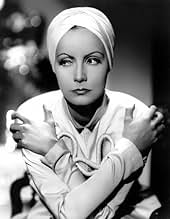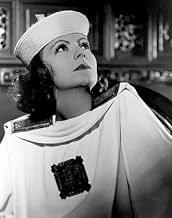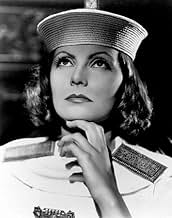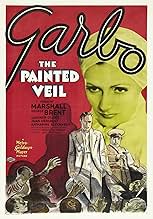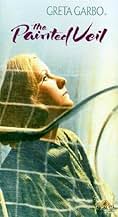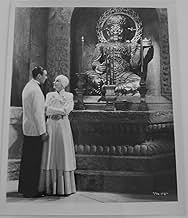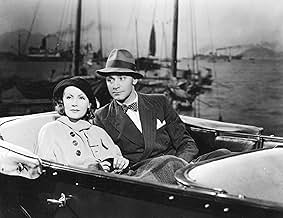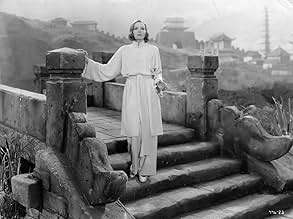AVALIAÇÃO DA IMDb
6,5/10
1,8 mil
SUA AVALIAÇÃO
Adicionar um enredo no seu idiomaA wife neglected by her husband, a medical researcher in China, falls in love with a dashing diplomatic attaché.A wife neglected by her husband, a medical researcher in China, falls in love with a dashing diplomatic attaché.A wife neglected by her husband, a medical researcher in China, falls in love with a dashing diplomatic attaché.
- Direção
- Roteiristas
- Artistas
- Prêmios
- 2 vitórias no total
Robert Adair
- Polo Player
- (cenas deletadas)
Mariska Aldrich
- German Teacher
- (cenas deletadas)
Maidena Armstrong
- German
- (cenas deletadas)
Billy Bevan
- Bridegroom
- (cenas deletadas)
Beulah Bondi
- Frau Koerber
- (cenas deletadas)
W.H. Davis
- German
- (cenas deletadas)
Vernon Dent
- Chief of Police
- (cenas deletadas)
Avaliações em destaque
Greta Garbo stars with Herbert Marshall, George Brent, Warner Oland, and Jean Hersholt in "The Painted Veil," from 1934, based on the novel by Somerset Maugham. Garbo plays an Austrian woman, Katrin, who grabs at the chance to marry her father's research assistant, Walter Fane (Marshall) after her sister marries and leaves home. At first, they are happy, as Katrin gets to see parts of the world she hasn't seen. Soon, however, she becomes lonely, as Walter is busy fighting a cholera epidemic.
Katrin falls for Jack Townsend (George Brent) from the British embassy, and the two enter into a passionate affair. Walter finds out; then Katrin is humiliated when she realizes that Jack cares more for his reputation than her and does not seem willing to get a divorce. Walter insists that she travel with him as he goes deeper into China to fight the epidemic; she realizes he just wants her to get sick and die.
Garbo is incredible in this film - warm, sweet, and flirtatious in the beginning, and rising to the dramatic challenges later, she gives a beautifully layered, sympathetic, and powerful performance. Marshall is very good, as is the rest of the cast - but Garbo just walks away with the whole thing. A very unusual presence and talent, very passionate and committed. It's such a shame that she didn't pursue opportunities for films in Europe after the war.
Also, the Chinese atmosphere (totally MGM backlot) feels very authentic.
This film ends differently from the 2006 version. Though I liked the 2006 version, it lacks the magic of this one. Magic, spelled G-a-r-b-o.
Katrin falls for Jack Townsend (George Brent) from the British embassy, and the two enter into a passionate affair. Walter finds out; then Katrin is humiliated when she realizes that Jack cares more for his reputation than her and does not seem willing to get a divorce. Walter insists that she travel with him as he goes deeper into China to fight the epidemic; she realizes he just wants her to get sick and die.
Garbo is incredible in this film - warm, sweet, and flirtatious in the beginning, and rising to the dramatic challenges later, she gives a beautifully layered, sympathetic, and powerful performance. Marshall is very good, as is the rest of the cast - but Garbo just walks away with the whole thing. A very unusual presence and talent, very passionate and committed. It's such a shame that she didn't pursue opportunities for films in Europe after the war.
Also, the Chinese atmosphere (totally MGM backlot) feels very authentic.
This film ends differently from the 2006 version. Though I liked the 2006 version, it lacks the magic of this one. Magic, spelled G-a-r-b-o.
The future looked a little uncertain for Greta Garbo in 1934. Under pressure from the rampant, crackpot Catholic League of Decency whose members were boycotting movie theatres and declaring 'purify or destroy Hollywood', the usually malleable Joseph Breen was obliged to make even stricter the Production Code. 'Mata Hari' was cut and 'Queen Christina' taken out of circulation whilst this adaptation of Somerset Maugham's 'The Painted Veil' needed to tone down its so-called sexual content and instead reflect moral values.
These factors alone cannot entirely explain why this film disappoints. Garbo's scenes with Herbert Marshall are excellent and there is a chemistry between her and George Brent owing to their relationship at the time being more than just professional. It just lacks that 'alchemy' by which everything comes together and falls below director Richard Boleslawski's usual high standards.
Garbo need not have worried as David 0. Selznick was soon to come to her aid. Whatever its flaws and despite being the least faithful to Maugham's original it remains, for this viewer at any rate, the most entertaining of the three versions. 'The Seventh Sin' of Ronald Neame and an uncredited Vincente Minnelli is rather lacklustre whilst it is probably kinder to draw a discreet veil over the most recent version directed by someone named John Curran.
These factors alone cannot entirely explain why this film disappoints. Garbo's scenes with Herbert Marshall are excellent and there is a chemistry between her and George Brent owing to their relationship at the time being more than just professional. It just lacks that 'alchemy' by which everything comes together and falls below director Richard Boleslawski's usual high standards.
Garbo need not have worried as David 0. Selznick was soon to come to her aid. Whatever its flaws and despite being the least faithful to Maugham's original it remains, for this viewer at any rate, the most entertaining of the three versions. 'The Seventh Sin' of Ronald Neame and an uncredited Vincente Minnelli is rather lacklustre whilst it is probably kinder to draw a discreet veil over the most recent version directed by someone named John Curran.
GARBO...the five-letter name, synonymous with glamour and mystery, fills the screen and overwhelms the film's title and the rest of the cast. The legendary actress, Greta Garbo, warranted the outsize billing, and her glowing image dominates this romantic triangle based on a novel by W. Somerset Maugham. Dr. Walter Fane is a research assistant in Austria, and he harbors romantic intentions for Katrin, the daughter of his superior. Summoning the courage to propose, Fane quickly weds Katrin, and the pair head to China, where Fane's friend, Jack Townsend from the British embassy, aggressively courts the often neglected Katrin. Further complications ensue when a cholera epidemic breaks out, and Fane insists that Katrin accompany him further into the Chinese interior, where she will be separated from Townsend, and he will fight the disease.
As Katrin, Garbo is luminescent. No surprise as to why, because she was photographed by William H. Daniels, who lensed 21 Garbo films, and was garbed by Adrian, who dressed her in some of her greatest roles. The screen goddess, a moniker the actress richly merits, is flawless in dress or image, whether profile or three-quarter view, close-up or full figure. When she quickly wraps a white scarf around her hair to go out, she emerges as pure elegance in full length white attire. Displaying all the mannerisms that her audience adored, from the fluttering eyelids and raised eyebrows to the subtle trembling of her mouth, Garbo is reason enough to see "The Painted Veil." Whether watching a Chinese pageant that resembles an act from the Ziegfeld Follies or running through streets filled with panicked Chinese, Garbo's makeup is pristine, her clothing spotless, and her air poised. The term "star" was coined for a screen presence such as hers.
Not surprisingly, Garbo's two male co-stars in the film pale in comparison. While neither Herbert Marshall nor George Brent were particularly memorable actors, they were often paired with strong actresses like Garbo or Bette Davis that unfairly cast them into the shadows. However, both Marshall and Brent were skilled and acquit themselves well here, although cognizant that audiences were there to see Garbo and not them. Whatever merits the Maugham novel possesses, the film's brief 85-minute running time is rushed, and motivations are not particularly convincing. The Marshall-Garbo marriage seems arbitrary and loveless from the start, and Townsend's pursuit of his friend's wife is a cold-hearted stab in the back. However, audiences did not come to analyze the characters or the plot, they came to see Garbo, and she gloriously commands attention in "The Painted Veil."
As Katrin, Garbo is luminescent. No surprise as to why, because she was photographed by William H. Daniels, who lensed 21 Garbo films, and was garbed by Adrian, who dressed her in some of her greatest roles. The screen goddess, a moniker the actress richly merits, is flawless in dress or image, whether profile or three-quarter view, close-up or full figure. When she quickly wraps a white scarf around her hair to go out, she emerges as pure elegance in full length white attire. Displaying all the mannerisms that her audience adored, from the fluttering eyelids and raised eyebrows to the subtle trembling of her mouth, Garbo is reason enough to see "The Painted Veil." Whether watching a Chinese pageant that resembles an act from the Ziegfeld Follies or running through streets filled with panicked Chinese, Garbo's makeup is pristine, her clothing spotless, and her air poised. The term "star" was coined for a screen presence such as hers.
Not surprisingly, Garbo's two male co-stars in the film pale in comparison. While neither Herbert Marshall nor George Brent were particularly memorable actors, they were often paired with strong actresses like Garbo or Bette Davis that unfairly cast them into the shadows. However, both Marshall and Brent were skilled and acquit themselves well here, although cognizant that audiences were there to see Garbo and not them. Whatever merits the Maugham novel possesses, the film's brief 85-minute running time is rushed, and motivations are not particularly convincing. The Marshall-Garbo marriage seems arbitrary and loveless from the start, and Townsend's pursuit of his friend's wife is a cold-hearted stab in the back. However, audiences did not come to analyze the characters or the plot, they came to see Garbo, and she gloriously commands attention in "The Painted Veil."
This film has some rather fantastic elements about it, mainly that Greta Garbo would be playing a spinster, and that having several suitors - as her mother claims that she has - she would hastily accept a marriage proposal from someone for whom she has absolutely no passion. In this case it is Herbert Marshall playing both an unloved husband and a devoted medical researcher into the cause and prevention of cholera. The other fantastic element is trying to believe that there is any chemistry between Garbo and "the other man, George Brent. Brent - who was so wonderful with Kay Francis, Bette Davis, and Ruth Chatterton - is here no more attractive than the husband he is trying to supplant. He has all the chemistry of a cardboard box.
The best part of the film is once Marshall realizes he has been cuckolded and makes an ultimatum to his faithless wife. He has just learned of a raging cholera epidemic in inland China and must go there and try to get it under control. His wife can stay behind if Brent's character agrees to get a divorce, in which case she can also have one. If he does not agree to this, then Garbo must come along with him on his expedition and thus be exposed to the most extreme danger.
This was one of Garbo's first films after the production code came into effect earlier in 1934. There were so many limits put on what could be said and shown and even insinuated that it really put a damper on what was supposed to be a pretty torrid love triangle. Trying to perform in a moral straight jacket is probably what really cost this film its potential edge. I'd recommend this for Garbo completists only.
The best part of the film is once Marshall realizes he has been cuckolded and makes an ultimatum to his faithless wife. He has just learned of a raging cholera epidemic in inland China and must go there and try to get it under control. His wife can stay behind if Brent's character agrees to get a divorce, in which case she can also have one. If he does not agree to this, then Garbo must come along with him on his expedition and thus be exposed to the most extreme danger.
This was one of Garbo's first films after the production code came into effect earlier in 1934. There were so many limits put on what could be said and shown and even insinuated that it really put a damper on what was supposed to be a pretty torrid love triangle. Trying to perform in a moral straight jacket is probably what really cost this film its potential edge. I'd recommend this for Garbo completists only.
Based on a book by W. Somerset Maugham of the same name, The Painted Veil tells the tale of Katrin Koerber (Greta Garbo) who is lonely after her sister's marriage, with whom she was very close. She agrees to marry her father's research associate Dr. Walter Fane (Herbert Marshall) who takes her to China. However, he is deeply involved with his work and often neglects Katrin in favour of his work which leads her to seek love and attention from another man: Jack Townsend (George Brent).
Although I have been unsure of Garbo's acting abilities at times, she does well and truly shine in the role of the unfaithful and confused wife - a complex character which she masters with ease. Herbert Marshall does a good job of her husband caught between emotions and George Brent not a terribly good looking man was unconvincing as her lover. These two men seem to fade into the background when Garbo is on screen her exotic; cat like appearance really captures the audience despite not playing a glamorous character!
The scenery of old China is lavish and the costumes for Garbo are a pleasure to see. However, the divine Greta Garbo is the only thing that really makes The Painted Veil watchable. The plot is thin and weak but Garbo does a wonderful job and makes the melodramatic material believable and interesting. Not a great film, but watch it for Garbo.
Although I have been unsure of Garbo's acting abilities at times, she does well and truly shine in the role of the unfaithful and confused wife - a complex character which she masters with ease. Herbert Marshall does a good job of her husband caught between emotions and George Brent not a terribly good looking man was unconvincing as her lover. These two men seem to fade into the background when Garbo is on screen her exotic; cat like appearance really captures the audience despite not playing a glamorous character!
The scenery of old China is lavish and the costumes for Garbo are a pleasure to see. However, the divine Greta Garbo is the only thing that really makes The Painted Veil watchable. The plot is thin and weak but Garbo does a wonderful job and makes the melodramatic material believable and interesting. Not a great film, but watch it for Garbo.
Você sabia?
- CuriosidadesRainha Christina (1933) and O Véu Pintado (1934) were both huge hits in Europe (making twice their budget in the UK alone), but were underwhelming US successes.
- Erros de gravaçãoA box is marked "Scotch Whiskey", which is the American spelling of whiskey. In the United Kingdom, however, it is spelled with no 'e' and is simply "whisky". Therefore, had the whisk(e)y been imported directly from Scotland, it should have had the 'whisky' spelling.
- Citações
Katrin Koerber Fane: [after Townsend impulsively kisses Katrin] How could you?
Jack Townsend: I could.
- Cenas durante ou pós-créditosGreta Garbo's name in the opening credits uses a font that forms the same Gothic arch in the letters as is used in W. Somerset Maugham's symbol. The other credits also use this to a lesser extent.
- ConexõesFeatured in Terra dos Deuses (1937)
- Trilhas sonorasBridal Chorus (Here Comes the Bride)
(1850) (uncredited)
from "Lohengrin"
Written by Richard Wagner
Played as background music in the wedding scene
Principais escolhas
Faça login para avaliar e ver a lista de recomendações personalizadas
- How long is The Painted Veil?Fornecido pela Alexa
Detalhes
Bilheteria
- Orçamento
- US$ 947.000 (estimativa)
- Tempo de duração
- 1 h 25 min(85 min)
- Cor
- Proporção
- 1.37 : 1
Contribua para esta página
Sugerir uma alteração ou adicionar conteúdo ausente

